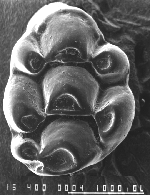
 GEOLOGICAL
SIENCES
GEOLOGICAL
SIENCES

 ALISA J. WINKLER
ALISA J. WINKLER
Ph.D., Southern Methodist University
Adjunct Professor
 lisa
Winkler's research interests
focus on the systematics, paleobiogeography, and paleoecology of fossil
mammals, in particular rodents and rabbits. Study is concentrated on
the Neogene (especially the Middle Miocene-Early Pliocene) of East
Africa, and the Pleistocene of Texas.
lisa
Winkler's research interests
focus on the systematics, paleobiogeography, and paleoecology of fossil
mammals, in particular rodents and rabbits. Study is concentrated on
the Neogene (especially the Middle Miocene-Early Pliocene) of East
Africa, and the Pleistocene of Texas.
Research in East Africa is primarily in conjunction with multidisciplinary teams studying major faunal accumulations, with an emphasis on recovering hominoid fossils and deciphering the ecological context in which these organisms lived and evolved. Study of the small mammals from these sites adds information on the associated faunal community. Paleoecological inferences from the small mammals aid in the reconstruction of African Neogene climate, and the role climate change played in the evolution of hominids and other taxa. Comparisons of East African small mammals with taxa from other parts of Africa and Eurasia support conclusions drawn from other mammals that intra- and intercontinental dispersal was a major factor affecting community change during the Neogene.
Alisa's current projects include small mammals from Maboko (western Kenya, 15 Ma), the Tugen Hills (central Kenya, 15-4 Ma), and Lothagam (7-3 Ma) and Kanapoi (4 Ma, both northern Kenya). Analysis of the Tugen Hills and Lothagam rabbits is in conjunction with studies of rabbits from the Siwaliks of Pakistan (with L. Flynn, Harvard University). Functional studies of Lothagam squirrels and rabbits continue.
Alisa is also active in studies of Pleistocene mammals (large and small) from Texas, including continued systematic work on the Fyllan Cave fauna (Austin), and description of a large muskox from northern Texas.
Alisa continues her position teaching Human Anatomy as Adjunct Assistant Professor with the Department of Cell Biology, University of Texas Southwestern Medical Center at Dallas.
 Selected Publications
Selected Publications
Xiaofeng, X., Winkler, A.J., and Jacobs, L.L., 1996, Is the rodent
Acomys a murine? An evaluation using morphometric techniques.
Pp. 660-675, in (K.M. Stewart and K.L. Seymour, eds.),
Paleoecology and Paleoenvironments of Late Cenozoic Mammals: Tributes to
the Career of C.S. (Rufus) Churcher, University of Toronto Press: Toronto.
Leakey, M.G., Feibel, C.S., Bernor, R.L., Cerling, T.E., Harris, J.M., McDougall, I., Stewart, K.M., Storrs, G.W., Walker A., Werdelin, L., and Winkler, A.J., 1996, Lothogram: a record of faunal change in the late Miocene of East Africa, Journal of Vertebrate Paleontology, 16(3):556-570.
Winkler, A.J., 1997, Systematics, paleobiogeography, and paleoenvironmental significance of rodents from the Ibole Member, Manonga Valley, Tanzania. Pp. 311-332, in (T. Harrison, ed.) Neogene Paleontology of the Manonga Valley, Tanzania: a Window into the Evolutionary History of East Africa, Plenum Press: New York.
Winkler, A.J., 1998, A new dendromurine (Rodentia: Muridae) from the middle Miocene of Western Kenya. Pp. 91-104, In (Y. Tomida, L.J. Flynn, and L.L. Jacobs, eds.) Advances in Vertebrate Paleontology and geochronology. National Science Museum Monographs, No. 14, Tokoyo.
Winkler, A.J., (in press) Rodents and lagomorphs from the Miocene and Pliocene of Lothagam, northern Kenya. In (M.G. Leakey and J.M. Harris, eds.), Lothagam: Dawn of Humanity in Eastern Africa. Columbia University Press.
Winkler, A.J., (in revision) Neogene paleobiogeography and Baringo paleoenvironments: contributions from the Tugen Hills rodents and lagomorphs, for Paleoanthropological Research in the Tugen Hills, Kenya, Special Issue of the Journal of Human Evolution.
Winkler, A.J. and W. Gose (in revision) Mammalian fauna and paleomagnetics of the Fyllan Cave Local Fauna, Travis County, Texas. For (B.W. Schubert, J.I. Mead, and R.W. Graham, eds.), Vertebrate Paleontology of Late Cenozoic Cave Deposits in North America. Indiana University Press.
|
Dr. Alisa J. Winkler Department of Geological Sciences Southern Methodist University Dallas, Texas 75275-0395 voice: (214) 768-2830 fax: (214) 768-2701 email: awinkler@mail.smu.edu |
|---|

 |
 |
 |
 |
 |
 |
 |

|